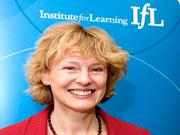Universal QTS requires further scrutiny, says IfL

A single route to becoming a qualified teacher through QTS risks a more comprehensive ‘professional teacher status’, says Toni Fazaeli, chief executive of the Institute for Learning (IfL).
The recommendation for an overarching qualification was made in Tuesday’s Skills Commission report into teacher training and vocational education.
Ms Fazaeli broadly welcomes the report, which includes evidence given by IfL, but says some of its recommendations need further scrutiny.
“This report was clearly fuelled by fiery enthusiasm and a passionate commitment to the profession of teaching and to vocational education, which we share,” she said.
“We wholeheartedly support the plaudits given to teachers and trainers across further education and skills – our members – and their important contribution to 14-19 education and to reconstructing our knowledge economy
“We were especially pleased to see IfL’s continuing professional development (CPD) framework being singled out as a sound model that could be applied to the wider teaching profession. We also agree that vocational teachers should be accorded high status and parity with teachers of other subjects across the Further Education and schools systems, and that FE teachers with Qualified Teacher Learning and Skills (QTLS) should be able to teach in schools. We support the recommendations to extend the master’s degree in teaching and learning (MTL) to FE teachers, and that mentoring should be included in Ofsted’s framework for college inspections. The importance given to research, CPD and dual professionalism is good to see.
“We do, however, have reservations about some of the report’s 26 recommendations, one of which relates to the concept of ‘a universal QTS’ as an overarching teaching qualification. The term ‘convergence’ suggests a single route to becoming a qualified teacher with full professional status, which we do not believe to be the right solution. We would rather explore a framework that leads to a more comprehensive ‘professional teacher status’, offering flexibility and transferability to ensure that we retain the distinctive features of our further education and skills sector and the importance of vocational routes into the teaching profession in our sector.
“Success breeds success, and first we must succeed in creating a ready route for FE teachers with QTLS to teach in schools as recognised qualified teachers. In these straitened times, we do not believe that it is right for the government and sector agencies to rapidly commit resources to grander architecture or re-engineering policy landscapes. We want 2010 to be the year when some teachers with QTLS can teach in a school setting the courses, and sometimes the same young learners, that they already teach successfully in FE college and work-based learning contexts. IfL will work with other agencies to make sure that some of our members with QTLS are the pioneers, bringing their expertise in teaching vocational subjects into schools to benefit more young learners.”
Susannah Fairbairn
(Pictured: IfL chief executive Toni Fazaeli)











Responses